- Home
- Kendare Blake
Girl of Nightmares Page 6
Girl of Nightmares Read online
Page 6
“Okay,” Thomas says. He nods to Carmel and takes her hand. “I mean, I think we’re fooling ourselves thinking we have a choice anyway. Whatever’s happening is happening, and I don’t think it’s going to stop. Unless we really do destroy the athame.”
They leave a little while later, and I spend the afternoon on painkillers, trying not to think about Anna and what might be happening to her. I keep checking my phone, waiting for Gideon to call back, but he doesn’t. And the hours tick by.
When my mom gets home, close to evening, she makes me a mug of decaf tea and spikes it with lavender to heal the burns from the inside. It’s not a potion. There are no enchantments. Witchcraft and pharmaceuticals don’t mix. But even without the mojo the tea is soothing. Plus, I’ve taken another Percocet, because my shoulders feel like they’re ready to rip clean off. It’s kicked in nicely, and I want to crawl under the covers and pass out until Saturday.
When I walk into my bedroom, I half expect Tybalt to be curled up on my navy blanket. Why not? If my dead girlfriend can cross over, then my murdered cat probably can too. But there isn’t anything there. I get into bed and try to get comfortable against my pillows. Unfortunately, burned shoulders make that pretty much impossible.
When I close my eyes, a chill creeps up my legs. The temp in the room has plummeted, like one of the windows has come open. If I were to breathe out in a huff, it would be a cloud of vapor. Under my pillow, the athame is practically singing.
“You’re not really here,” I say to convince myself. Maybe to will it into truth. “If it was really you, it wouldn’t be like this.”
How would you know, Cassio? You’ve never even been dead once. I’ve been dead lots of times.
I let my eyes drift up, just far enough to see her bare feet pressed into the corner beside my dresser. Up just a little farther, to the white hem of her skirt, below her knees. I don’t want to see any more. I don’t want to see her break her own bones, or throw herself through my window. And her damn blood can stay inside of her nose too, thank you. She’s more terrifying this way than she ever was with black veins and drifting hair. Anna Dressed in Blood I knew how to face. The empty shell of Anna Korlov … I don’t understand.
The figure in the corner is half-encased in shadow, not much more substantial than moonlight.
“You can’t be here. Not really. My mom’s barrier spell is still up on the house.”
Rules rules rules. No rules anymore.
Oh. Really. Is that how it is? Or are you just a figment, like Carmel says? Maybe you’re not even you. Maybe you’re a trick.
“Are you just going to stand there all night?” I ask. “I want to get some sleep, so if there’s something mind-numbingly disturbing you want to show me, can we just get it over with?” My intake of breath is sharp, and a tight lump rises in my throat when her feet start to move, taking short, shuffling strides toward my bed. She comes so close, just outside of my reach. Then she lowers herself to sit beside my feet, and I see her face.
Anna’s eyes are her own, and the sight of them shakes me out of the drugs like ice water across my back. The expression on her face is the same as it was in all of my imaginings. It’s like she knows me. Like she remembers. We stare at each other for a long time. Shudders run through her, and she flickers, like an image from an old film strip.
“I miss you,” I whisper.
Anna blinks. When she looks at me again, her eyes are red with blood. A ripple of pain passes through her jaw as phantom cuts open and close across her chest, grotesque flowers of red blooming and disappearing down her arms.
I can’t do anything to help. I can’t even hold her hand. She’s not really here. The burns sear my shoulders as I sink back into my pillow and for a while we sit silently, passing pain back and forth. I keep my eyes open for as long as I can stand to, because she wants me to see.
CHAPTER SEVEN
I finally get fed up with waiting, and call Gideon again in the morning. For a minute I think it’s just going to ring and ring, and I’m starting to wonder if maybe something’s happened to him, when he picks up.
“Gideon? Where have you been? Did you get my message?”
“Early this morning. I would have called, but you’d have been asleep. You sound terrible, Theseus.”
“You should see how I look.” My hand drags roughly across my face, muffling the last few words. Ever since I was a kid, Gideon could solve any problem. Whenever I needed answers, he had them. And he’s who my dad turned to, if things got rough. He has his own brand of magic, popping in and out of my childhood at the perfect times, coming through our front door in a dapper suit with some weird English food for me to try. Whenever I saw his bespectacled face, I knew everything was going to be okay. But this time I get the feeling that he doesn’t want to hear what I have to say.
“Theseus?”
“Yeah, Gideon?”
“Tell me what’s happened.”
What’s happened. He makes it sound so easy. I must’ve sat in my bedroom with Anna for four hours, watching her skin peel back and her eyes leak blood. Sometime between then and dawn, I fell asleep, because when I opened my eyes it was morning, and the foot of my bed was empty.
And now it’s daytime, full-on sunshine with its ridiculous sense of safety. It drives everything that happens in the dark a million miles away. It makes it seem impossible, and even though the memory of Anna’s wounds is fresh and the image of her burning inside that furnace is blasted onto the backs of my eyelids, in the daylight it almost feels like make-believe.
“Theseus?”
I take a breath. I’m standing on my front porch, and the morning is quiet except for the creaking boards beneath my feet. There’s no breeze, and the sun is livening the leaves, warming the fabric of my shirt. I’m acutely aware of the empty space in the bushes where I saw Anna standing, staring in.
“Anna’s back.”
On the other end of the line, something clatters to the floor.
“Gideon?”
“She can’t be. It isn’t possible.” His voice has gone low and terse, and somewhere inside me a five-year-old cringes. After all these years, Gideon’s anger still has power. One harsh word from him and I’m a puppy with its tail between its legs.
“Possible or not, she’s here. She’s contacting me, like she’s asking for help. I don’t know how. I need to know what to do.” The words fall out without a note of hope. All of a sudden it hits—how tired I am. How old I feel. Morfran’s words, about destroying the athame, melting it down, and letting it fall into deep water, twist in the back of my head. The thought is disconnected, but comforting, and it has something to do with Thomas and Carmel, and something else, if I let my mind wander a little farther. Something I said to Anna once, about possibilities. And choices.
“I think it’s the athame,” I say. “I think something’s happening to it.”
“Don’t blame the athame. You’re the one who wields it. Don’t forget that,” he says, his voice stern.
“I never forget that. Not for a single minute. Not since Dad died.”
Gideon sighs. “When I met your father,” he says, “he wasn’t much older than you are now. Of course, he hadn’t been using the athame for near so long as you have. But I remember thinking how old he seemed.
“He wanted to give it up once, you know.”
“No,” I say. “He never told me.”
“Well, I suppose that it didn’t matter, afterward. Because he didn’t.”
“Why didn’t he? It would have been better for everyone if he had. He’d still be here.” I stop suddenly and Gideon lets me finish my own thought. My dad would still be here. But other people wouldn’t. He saved who knows how many lives by putting away the dead, and so have I.
“What am I going to do about Anna?” I ask.
“Nothing.”
“Nothing? You can’t be serious.”
“I am serious,” he says. “Quite serious. The girl was tragic. We all know that. But you nee
d to put her away and do your job. Stop looking for things you have no business looking for.” He pauses, and I don’t say anything. It’s almost exactly what Morfran said, and it makes the hairs stand up on my forearms.
“Theseus, if you’ve ever trusted me before, trust me now. Just do your job. Do your job, and let the girl go, and none of us have anything to fear.”
* * *
I go back to school, to the surprise of nearly everyone. Apparently, Carmel had already circulated news of my “illness.” So I put up with curious questions, and when they ask about my sore and bandaged shoulder, the white edge sticking up from my shirt collar, I grit my teeth and tell them about my camping accident. It was funny at the time but now I wish my mom had picked a less embarrassing cover story.
I suppose I could have just stayed home, like I intended. But rattling around the empty rooms like a lonely, crazy marble while my mom made the rounds to clients and occult suppliers wasn’t my idea of a good time. I didn’t feel like watching TV all day, waiting for Anna to come crawling through it like that mildew-covered chick from the Ring movies. So I came back, determined to soak up the last of what these junior year teachers had to tell me. It was supposed to be like someone kicking you in the shin to take your mind off your broken arm. But now, at every turn, in every class, Anna is on my mind. None of the end-of-the-year lessons are interesting enough to drive her away. Even Mr. Dixon, my favorite teacher, just sort of phones it in talking about the aftermath of the Seven Years’ War. My mind wanders, letting her back in, and Gideon’s voice explodes between my ears. Stop looking for something you have no business looking for. Let her go. Or is it Morfran’s voice? Or Carmel’s?
The way that Gideon said it, that as long as I let her go, we have nothing to fear … I don’t know what that means. Trust me, he said, and I do. It’s not possible, he said, so I believe him.
But what if she needs me?
“So we pretty much just got given to England.”
“Huh?”
I blink. Carmel’s friend Nat is turned around in her seat, squinting at me curiously. Then she shrugs.
“You’re probably right.” She glances toward Mr. Dixon, who has gone to sit at his desk to mess with something on his laptop. “He probably doesn’t care if we talk about the war for real. So.” She sighs, looking like she’d rather be sitting in front of anyone else. “You going to come with Carmel to the senior party?”
“Isn’t that just for seniors?” I ask.
“Come on. It’s not like they’re going to card you and kick you out if you’re not one,” she scoffs. “Well, maybe if you were a freshman. Thomas could even come. Cas? Cas?”
“Yeah,” I hear myself say. But not really. Because Nat’s face isn’t her face anymore. It’s Anna’s. The mouth moves with hers, but not the expression. Like a mask.
“You’re acting really weird today,” she says.
“Sorry. My Percocet’s wearing off,” I mutter, and slide out of the desk. Mr. Dixon doesn’t even notice when I walk out of the classroom.
When Thomas and Carmel find me, I’m sitting on the quiet stage in the middle of the theater, staring up at the rows of blue-covered seats, all empty except for one. My trig text and notebook are beside me in a neat stack, as a reminder of where I’m supposed to be.
“Is he catatonic?” Thomas asks. They came in a few minutes ago but I didn’t acknowledge them. If I’m going to ignore one friend I may as well ignore them all.
“Hey guys,” I say. Their movements echo loudly through the empty theater as they drop their books and climb up onto the stage.
“You do a pretty good job of avoiding things,” says Carmel. “But then again maybe not. Nat says that you were acting weird during discussion questions in history.”
I shrug. “Anna’s face transposed over hers while she was talking. I thought I showed a fair amount of restraint.”
They exchange one of their ever more frequent looks as they sit on either side of me.
“What else have you seen?” Thomas asks.
“She’s in pain. Like she’s being tortured. She was in my room last night. There were wounds, opening and closing on her arms and shoulders. I couldn’t do anything to help her. She wasn’t really there.”
He pushes his glasses up on his nose. “We have to find out what’s going on. That’s—that’s sick. There must be a spell, something to reveal—”
“Maybe mysticism isn’t what we need right now,” Carmel interjects. “What about something else, like maybe a psychologist?”
“They’d just drug him to the gills. Tell him he’s got ADD or something. And besides, Cas isn’t insane.”
“Not to be a downer, but schizophrenia can strike at any time,” she says. “It’s actually common for it to manifest around our age. And the hallucinations seem just as real as you or me.”
“What are you talking about schizophrenia for?” Thomas blurts.
“I’m not saying that specifically! But he’s been through a significant loss. None of it might be real. Have you seen anything? Have you even felt anything weird like your grandpa said?”
“No, but I’ve sort of been slacking off in my voodoo studies. I’ve got trigonometry, you know?”
“I’m just saying it doesn’t always have to be spirits and magic. Sometimes hauntings are in your mind. It doesn’t make them less real.”
Thomas nods and takes a breath. “Okay, that’s true. But I still think a shrink is the wrong way to go.”
Carmel makes a growling noise. “Why do you have to jump straight to a spell? Why are you so sure it’s paranormal?”
This is as close as I’ve ever heard to a Thomas and Carmel argument. And as special as it is to listen to your friends argue over whether or not you have a mental illness, I’m starting to get the urge to go back to class.
Stop poking your nose around where it doesn’t belong, before someone cuts it off. There’s something else going on around you, like a storm.
I don’t care.
In the sixth row of the theater, in the third chair in, Anna winks at me. Or maybe she just blinks. I can’t tell. She’s missing half of her face.
“Let’s go talk to Morfran,” I say.
* * *
The bell over the antique shop door jingles and there’s the click-click-clatter of dog toenails on hardwood before Stella collides with my legs. I give her a few scratches and she gazes up at me with huge brown eyes like a seal pup’s before moving on to Carmel.
We aren’t the only ones in the shop. Morfran’s talking to two women, forty-something ladies in sweaters asking questions about one of the china washbasins. Morfran laughs and starts telling them a cozy little historical tale that may or may not be true. It’s weird to watch him with customers. He’s so nice. We try not to make too much of a ruckus on our way to the back room. After a few minutes, we hear the women saying good-bye to Stella and thank you to Morfran, and seconds later, he and the dog walk through the curtain into the back, where he keeps the stranger and more obscure occult supplies. My mom’s candles enjoy a table in the front window. She’s gone mainstream.
The way Morfran’s looking at me, I expect him to produce one of those doctor’s flashlights and check my pupil response. His arms are crossed over his chest, bunching up the black leather of his vest and covering the Aerosmith logo on his t-shirt. When Thomas tosses him a freshly packed pipe of tobacco, his hand shoots up and catches it, and his eyes never leave my face. It’s hard to believe that the kindly antique shop proprietor and this man of dark magic are one and the same.
“You kids here for an after-school snack?” he asks as he lights up. Then he checks his watch. “Can’t be. School’s not out for another five hours.”
Thomas clears his throat uncomfortably, and Morfran’s furry eyebrow lifts in his direction
“You flunk out and you’ll be picking crud out of everything I buy up at swap meets this summer.”
“I’m not flunking out. It’s the last two weeks. Nobody even
cares anymore really.”
“I care. Your mama cares. And don’t you forget it.” He nods at Carmel. “What about you?”
“Perfect grade point average,” she replies. “And it’ll stay that way. It’s all about results, my dad says.” Her smile is sweet, apologetic but confident. Morfran shakes his head.
“You talk to that Brit friend of yours?” he asks me.
“Yeah.”
“What’d he say?”
“He said to let it go.”
“Good advice.” He draws on his pipe; the smoke obscures his face as he exhales.
“I can’t take it.”
“You should.”
Carmel steps forward, her arms crossed over her chest. “Why should he? Can you stop being so cryptic? Maybe if you’d just tell us what’s going on, tell us why we should let it go, then maybe we would.”
He exhales and looks away from her, sets his pipe down on the glass countertop. “Can’t tell you what I don’t know. It’s not an exact science. Not a news bulletin. It just blinks up, in here,” he says, and points to his chest. “Or in here”—he points to his temple. “It says stay away. It says let it go. People are watching you. The kind of people you don’t mind just watching, but you hope they never show up. And there’s something else.” He draws again on the pipe, looking thoughtful, which is really the only way you can look when smoking a pipe. “Something is trying to hold this back, while another thing is trying to draw it on. And that’s the thing that concerns me most, you want to know the truth. Makes it hard to hold my tongue.”
“Hard to hold your tongue on what?” I ask. “What do you know?”
Morfran looks at me through the smoke but I don’t drop my eyes. I’m not letting this go. I can’t. I owe her. And more than that. I can’t think that she’s suffering.
“Just drop it, all right?” he says, but I hear it. The resolve has gone out of his voice.
“What do you know, Morfran?”
“I know…” He sighs. “Someone who might know something.”

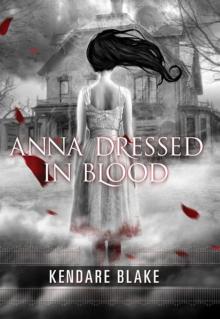 Anna Dressed in Blood
Anna Dressed in Blood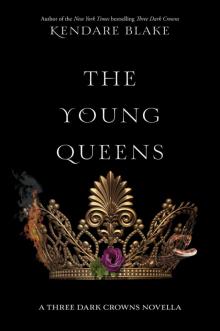 The Young Queens
The Young Queens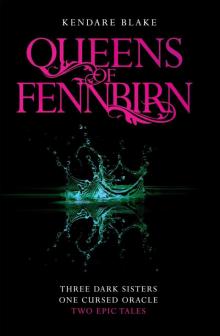 Queens of Fennbirn
Queens of Fennbirn Antigoddess
Antigoddess The Dogs of Athens
The Dogs of Athens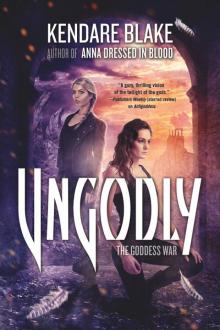 Ungodly
Ungodly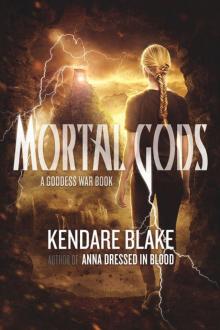 Mortal Gods
Mortal Gods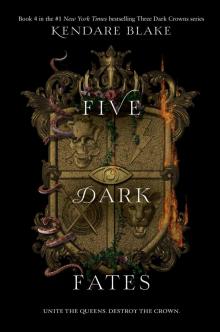 Five Dark Fates
Five Dark Fates Girl of Nightmares
Girl of Nightmares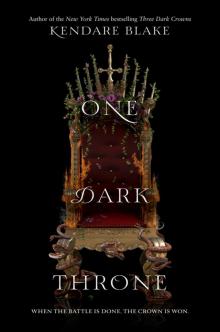 One Dark Throne
One Dark Throne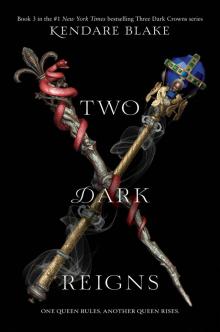 Two Dark Reigns
Two Dark Reigns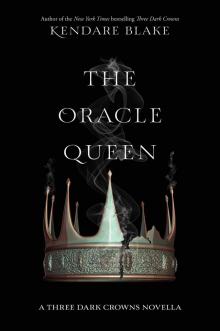 The Oracle Queen
The Oracle Queen Antigoddess gw-1
Antigoddess gw-1